
Dubai is rapidly transforming into a world-class logistics and supply chain hub, strategically positioned to facilitate global trade. Abdulla Al Hashmi, CEO of Parks and Zones at DP World GCC, states, “Dubai is the best place to launch and test a product. Its diverse population of over 200 nationalities offers a dynamic sample pool for innovations, while its advanced infrastructure enables businesses to scale globally.” Rishab Kapoor, Founder of Ray Holding, reinforces this notion, emphasizing that Dubai’s ecosystem encompasses more than just a strategic location; it combines infrastructure, policy, and geopolitical advantages to attract global enterprises.
Central to this logistics ecosystem is the Dubai Logistics Corridor, which integrates sea, air, and land transport. With Jebel Ali Port, Al Maktoum International Airport, and an extensive network of roads and industrial zones, Dubai connects directly to over 300 cities worldwide, accounting for 65% of global GDP and 3.5 billion consumers.
According to the 2023 World Bank Logistics Performance Index, the United Arab Emirates ranks seventh globally, affirming its status as a logistics leader. Dubai’s success is fueled by three core pillars:
- Strategic Location and Infrastructure: Located at the crossroads of Asia, Europe, and Africa, Dubai benefits from world-class facilities like Jebel Ali Port and Al Maktoum International Airport. The presence of special economic zones (SEZs) fosters ancillary businesses, contributing significantly to trade. In 2019, trade value from Jebel Ali clients was $99 billion, which is projected to rise to $190 billion by 2024.
- Policy Innovation and Digital Transformation: Dubai’s Economic Agenda focuses on logistics within its non-oil diversification strategy. The Land Transport Strategy aims to double the sector’s contribution to AED 16.8 billion by 2030. Technological advancements, including automation and blockchain, are transforming logistics operations, with initiatives like AI forecasting and drone delivery trials at the Dubai South Innovation Centre.
- Geopolitical Influence and Trade Agreements: Dubai’s influence is amplified through trade agreements like the Comprehensive Economic Partnership Agreement (CEPA), which reduces customs duties and promotes trade corridors. The UAE’s economic partnership with India has led to substantial growth in bilateral trade.
Dubai South serves as a future-ready ecosystem, attracting companies like Ray Holding due to its planned infrastructure and proximity to major transport hubs. The region’s design supports scalable warehousing and logistics operations, essential for evolving supply chains.
Indian businesses stand to gain significantly from Dubai’s logistics boom. With reduced tariffs and efficient customs clearances, Dubai offers a staging ground for Indian goods targeting Europe and Africa. The local market is lucrative, characterized by a diverse consumer base and high spending power. Government incentives and initiatives like Bharat Mart aim to facilitate trade for Indian companies, providing access to integrated storage and distribution networks.
In conclusion, Dubai’s commitment to infrastructure, digital innovation, and open trade policies positions it as a vital player in the global logistics landscape. As the world navigates supply chain challenges, Dubai’s strategic advantages and business-friendly environment continue to attract a wide range of industries.



